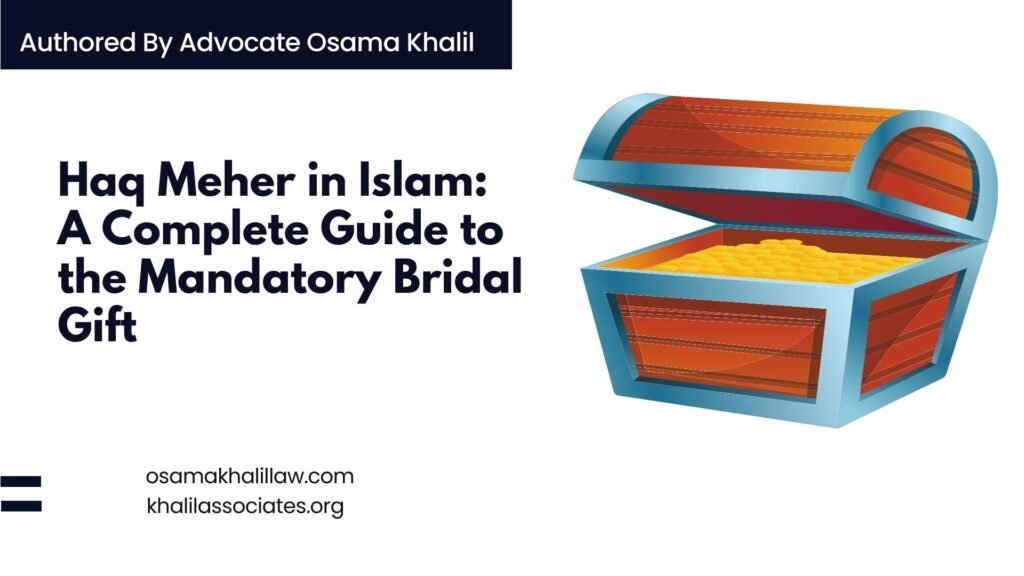
Haq Meher in Islam is a fundamental right of every Muslim bride. Moreover, it serves as a financial security for the wife. Furthermore, Allah has made it obligatory in the Quran. Therefore, understanding Haq Meher is essential for every Muslim.
What Is Haq Meher (Mahr in Islam)?
Haq Meher, also known as Mahr in Islam, is a mandatory gift that a husband gives to his wife. Additionally, it symbolizes love, respect, and responsibility. Moreover, it is not a dowry but a right solely for the wife.
The Importance of Haq Meher in Islam
Haq Meher holds great importance in Islamic marriage. First, it ensures financial security for the wife. Second, it shows the husband’s commitment. Third, it distinguishes Islamic marriage from other customs where dowry burdens the bride’s family.
Types of Haq Meher in Islam
Islam recognizes two types of Haq Meher.
1. Prompt Haq Meher (Mu’ajjal)
Prompt Haq Meher means the husband pays it immediately after marriage. Furthermore, the wife can demand it right after the Nikah.
2. Deferred Haq Meher (Mu’wajjal)
Deferred Haq Meher means the husband pays it later, either on demand or at divorce or death. However, it remains a debt on the husband until paid.
Haq Meher in the Quran and Hadith
Allah mentions Haq Meher in the Quran:
“And give the women their bridal gifts graciously.” (Quran 4:4)
Additionally, the Prophet Muhammad (PBUH) emphasized its importance. For example, he said:
“Search for something, even if it is an iron ring, to give as Mahr.” (Bukhari)
How Much Should Haq Meher Be?
Islam does not fix a specific amount for Haq Meher. However, it should be reasonable. Furthermore, the Prophet (PBUH) discouraged excessive Mahr. Conversely, it should not be too little to disrespect the wife.
Can Haq Meher Be Non-Monetary?
Yes, Haq Meher can be anything valuable. For instance, it can be gold, property, or even knowledge (like teaching Quran). Moreover, the wife must agree to it willingly.
What Happens If Haq Meher Is Not Paid?
If the husband does not pay Haq Meher, the wife has full rights to claim it. Additionally, she can refuse marital relations until paid. Furthermore, it remains a debt even after divorce.
Common Misconceptions About Haq Meher
Many people confuse Haq Meher with dowry. However, dowry is given by the bride’s family, whereas Haq Meher is the husband’s duty. Moreover, some think it is optional, but it is compulsory in Islam.
Haq Meher and Divorce
If divorce occurs before payment, the husband must still pay Haq Meher. Additionally, if the wife initiates Khula, she may return it, but this is not mandatory.
Real-Life Examples of Haq Meher
The Prophet (PBUH) gave simple yet meaningful Haq Meher. For example, he gave Hazrat Aisha (RA) household items and knowledge. Furthermore, Hazrat Ali (RA) gave his shield as Mahr to Fatima (RA).
How to Decide Haq Meher Amount
The amount should consider the husband’s financial status. Moreover, cultural practices should not overshadow Islamic principles. Therefore, families should discuss it openly.
Legal Status of Haq Meher in Muslim Countries
Many Muslim countries enforce Haq Meher legally. For instance, Pakistan and Egypt have laws ensuring wives can claim it in court.
Haq Meher in Non-Muslim Countries
Even in non-Muslim countries, Haq Meher remains valid. Furthermore, Islamic courts or civil laws can help enforce it if needed.
Frequently Asked Questions About Haq Meher
1. Can Haq Meher Be Waived?
Yes, but only if the wife willingly forgives it.
2. What If the Husband Cannot Pay?
He can pay in installments or the wife can reduce the amount.
3. Is Haq Meher Only for First Marriage?
No, it applies to every marriage in Islam.
Conclusion: Haq Meher as a Woman’s Right
Haq Meher in Islam is not just a tradition but a divine right. Moreover, it protects women’s dignity and financial security. Therefore, every Muslim must understand and fulfill this obligation properly.
By learning about Haq Meher, we ensure justice and fairness in marriage. Furthermore, it strengthens the bond between husband and wife. Thus, Muslims should always honor this sacred duty.
Legal Assistance
For professional legal guidance and support in immigration matters, you may contact:
Mr. Osama Khalil
Lawyer & Legal Consultant
📞 Phone: 0316-1829946
📧 Email: contact@osamakhalillaw.com | contact@khalilassociates.org
